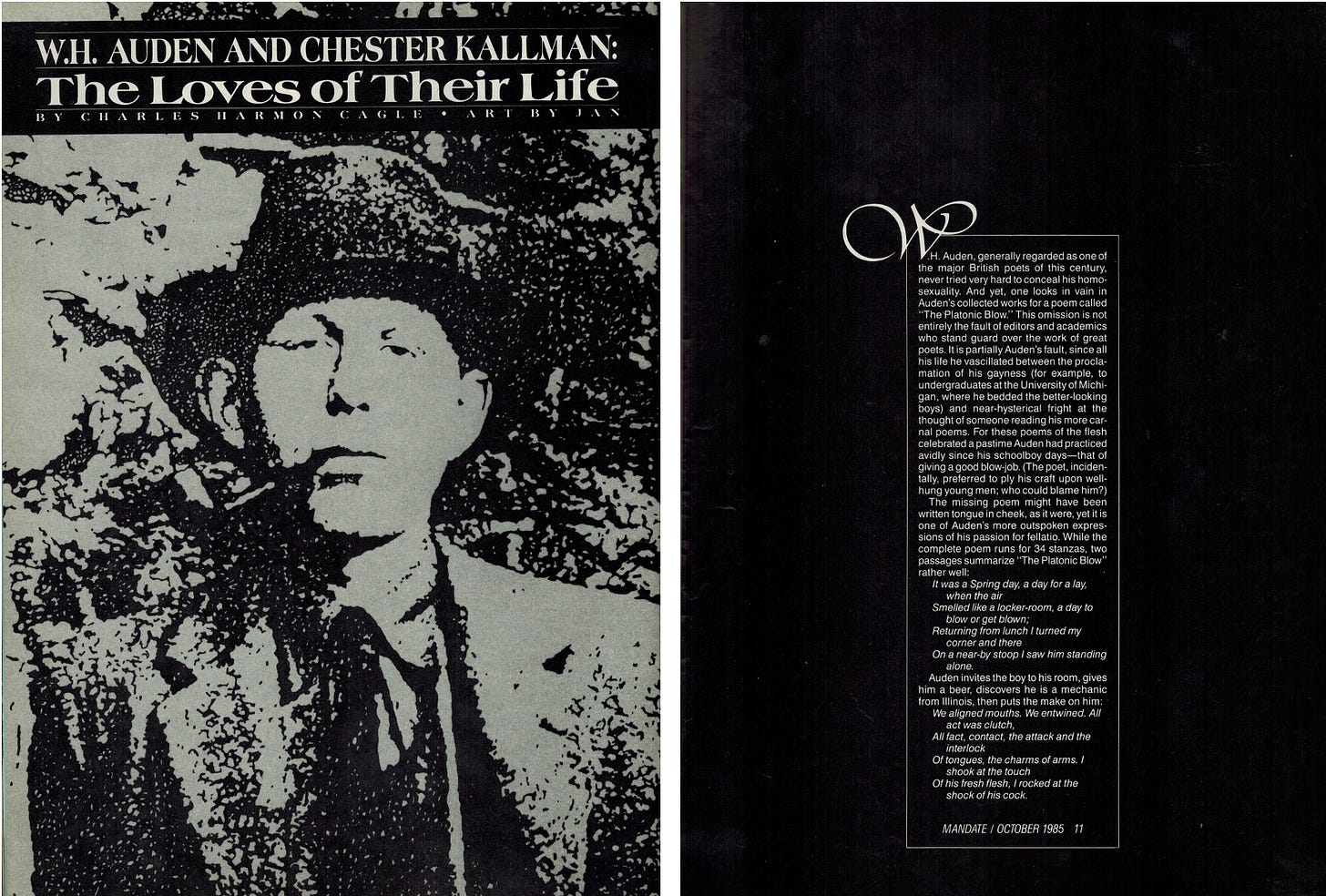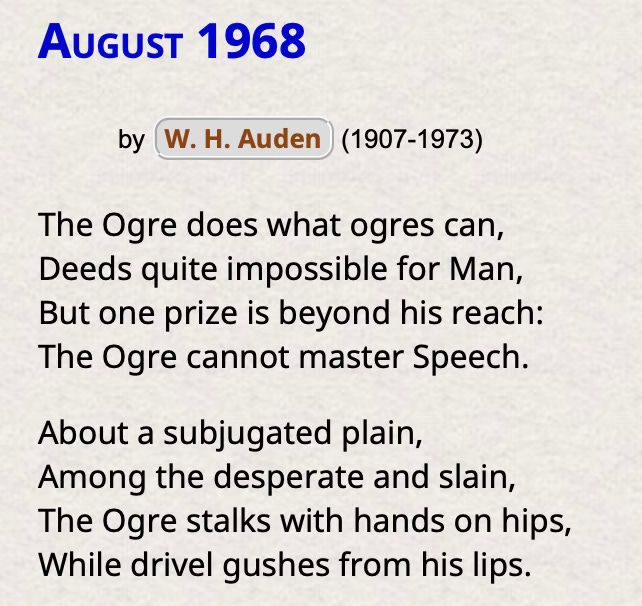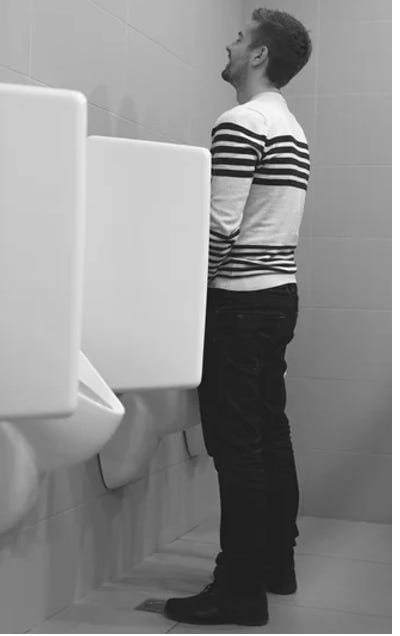The Bishop-Elect of Hong Kong
Has a cock which is ten inches long;
If he thinks the spectators
Are admiring his gaiters
When he goes to the Gents--he is wrong. — Wystan Hugh (W.H.) Auden
You won’t find this bawdy limerick in those reverent poety anthologies that elevate Auden to poet laureate manqué — manqué because he missed so many deserved accolades. As a poet, he was overshadowed by T.S. Eliot. Then, too, was Auden British or American? Both, or neither? He spent his early years in England, part of his youth in Germany, sailed to the U.S. in 1939, and became a citizen a few years later. Some considered this equal to desertion when war was inevitable; for that reason, he missed a number of honors in Britain. For instance, he was never given a knighthood with the accompanying title, Sir Wystan. And not for a moment was he thought of for Britain’s poet laureate.
He was openly gay, so of course in homophobic, puritanical America he was “the queer poet,” before the word “queer” was taken up as a militant label by proud young queers. But was he really all that queer? He was, after all, married to a woman. And yet…and yet — there were the many male lovers. Not to mention his religion: Auden was a devout member of the Episcopal Church long before its official welcome of gays.
It’s frightfully confusing. Do have a spot of tea, Luv, while Charles Harmon Cagle explans it all for you.

Auden wrote the following poem in oblique protest of the Soviet invasion of Czechoslovakia in August, 1968. It’s unlikely that the poet ever heard the name Donald Trump, but he lived in the years when Stalin in the Soviet Union, Hitler in Germany, Mussolini in Italy, Mao Tze-tung in China, and the likes of Senator Joseph McCarthy in the U.S. murdered and terrorized entire populations. Auden knew the boilerplate of tyranny.
Remind you of anyone? Someone whose speech resembles an elementary-school bully, despite his claim of having “the best words.” Someone who is racist, homophobic, misogynistic, xenophobic. A “christian” (small c) who holds his Bible upside down and thinks that “God bless America” must be in there somewhere.
An unstoppable liar who prefaces most of his adjectives with the word “very”? Who never shuts his mouth, “while drivel gushes from his lips,” who praises the Russian dictator while alienating every ally nation, and who will continue his mission to destroy American democracy until he is dead and a stake is driven through his rotten heart.
The link below takes you to an article about Auden’s life in the East Village of New York. In it you’ll see photos of Auden and an exterior shot of the unspectacular apartment building at 77 St. Mark’s Place where the poet lived from 1953 to 1972.
One of Auden’s most famous poems is known by two titles: “Lay Your Sleeping Head, My Love” and “Lullaby.” It’s widely anthologized, usually under the shorter title.
It is often referred to, in those anthologies and in critical writing about the poet, as a “gay poem,” or as “Auden’s love poem to” [fill in the blank with name of male lover]. The problem is this: nothing in the poem indicates that it is one man addressing another. Read it as closely as you wish, remove every word with tongs and scrutinize them one by one under a microscope, and the poem could still be written by a man to a woman. Or, for that matter, by a woman to a man or a woman to a woman. (Remove the word “human” and I could almost address it to my cats.) In Auden’s case, we know that it was probably written as a love poem to a man, but that leads us away from the poem and into biography, which is a minefield when you’re talking about literature or any of the arts.
A work of art — poem, novel, play, song, painting — should stand on its own merits and be judged accordingly. The life of the artist may be of interest, it might even shed oblique light on the work of art, but unless you can prove whatever point by the work itself, you’ve lost the argument. It won’t stand up in court.
I recently discussed this poem with two gay friends, both teachers of literature with long experience. One agrees with me that nothing in the poem indicates the speaker has a male lover in mind. The other friend believes the opposite because, he said, a heterosexual man would not use this particular language to his female lover. A point worth considering, certainly, although I remain unconvinced.
In fact, I don’t care for the poem at all. I consider it one of Auden’s least successful ones owing to the awkward, colorless language starved for images. The poem is undernourished, and also bloated with abstractions: “time,” “beauty,” “soul,” “supernatural,” “universal love and hope,” etc. It’s like reading a page of German philosophy.
Whoever Auden had in mind, I hope it was a good lay. It’s not a good poem.
Auden was better when earthy, as in this quote: “Only in America do men cower in public restrooms and scrub their hands after pissing, as if the penis were an object too filthy for any decent person to touch.”











